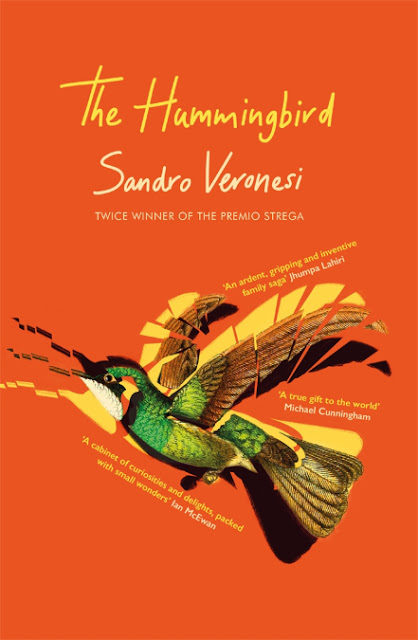The Hummingbird
by Sandro Veronesi
translated by Elena Pala
The hummingbird of the title (Il Colibrì in the original Italian) is the novel’s protagonist, Marco Carrera. His nickname is given by his mother, due to a physical condition which keeps him considerably smaller and shorter than average for his age-group. After an experimental treatment during his adolescence, Marco grows quickly and settles down to a more “normal” life, albeit one marked by several challenges and tragedies. Throughout, Marco, like the bird to which he is compared, shows a marked talent for staying still while everyone and everything around him changes.
Veronesi gives us a life history of Marco and his family, against the backdrop of Italian contemporary events, from the sixties to the present, with a glimpse into an imaginary near future (the timeline of the novel ends with Marco’s death in 2029). This is an approach which, it seems to me, Italians are particularly good at, not only in the context of literature but also in movies. Despite my very amateur knowledge of Italian cinema, I can name, off the cuff, several films which also opt for this sort of narrative. Indeed, I found myself picturing The Hummingbird turned into a filmscript and started fantasizing about the actors I would choose for the cast of my imaginary film project. A quick internet search revealed that, predictably, I was hardly the first to come up with this idea. Veronesi’s book is already being turned into a movie by veteran director Francesca Archibugi, who has nicked some of the actors I had in mind...
What is original about the novel is its postmodern structure. Passages in the third person alternate with letters, emails, lecture notes – even a furniture inventory and a list of science fiction volumes – to create a colourful and engaging mosaic. Interwoven as a running thread is an account of Marco’s more-or-less platonic relationship with his first and greatest love, Luisa, recounted through a lifetime’s erratic correspondence.
I particularly liked the underlying humour – the therapist Carradori is a brilliant comedic creation, although he is also, quite surprisingly, a source of some of the wisest observations in the book. So is Carrera’s friend “L’Innominabile” (“The Omen”) Duccio. I was less convinced about the final parts of the book, for two reasons. First of all, Veronesi introduces quasi-fabulist elements which mark a rather incongruous departure from the largely realist (if not always completely realistic) approach adopted in the earlier part of the novel. I also felt the penultimate segment to be rather “manipulative”, uncomfortably hovering between sentiment and sentimentality, raising thorny ethical issues which are cursorily set aside in a wash of emotion.
Reservations
aside, I believe that this is a worthy winner of the prestigious Premio
Strega (Veronesi's second win, after his 2008 success with Caos Calmo). The English edition which is
being issued by W&N marks an auspicious debut for Elena Pala – this is her
first book-length translation, although you certainly wouldn’t realise that
while reading her brilliant translation.








No comments:
Post a Comment